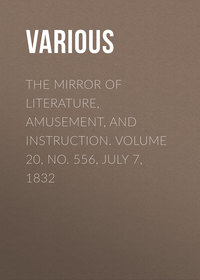The Mirror of Literature, Amusement, and Instruction. Volume 20, No. 556, July 7, 1832

Полная версия
Добавить В библиотекуАвторизуйтесь, чтобы добавить
Добавить отзывДобавить цитату
The Mirror of Literature, Amusement, and Instruction. Volume 20, No. 556, July 7, 1832
Авторизация